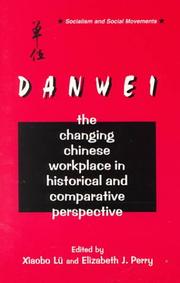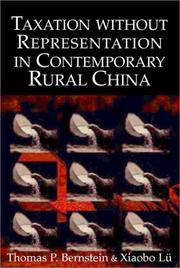| Listing 1 - 6 of 6 |
Sort by
|

ISBN: 0804739587 9780804739580 Year: 2000 Volume: *13 Publisher: Stanford (Calif.): Stanford university press
Abstract | Keywords | Export | Availability | Bookmark
 Loading...
Loading...Choose an application
- Reference Manager
- EndNote
- RefWorks (Direct export to RefWorks)
"Cadres and Corruption reveals the long history of the Communist Party's inability to maintain a corps of committed and disciplined cadres. Contrary to popular understanding of China's pervasive corruption as an administrative or ethical problem, the author argues that corruption is a reflection of political developments and the manner in which the regime has evolved."--Jacket.
S11/0920 --- S06/0420 --- S06/0425 --- Political corruption --- -Boss rule --- Corruption (in politics) --- Graft in politics --- Malversation --- Political scandals --- Politics, Practical --- Corruption --- Misconduct in office --- China: Social sciences--Corruption --- China: Politics and government--CCP: since 1949 (Here also general policy and ideology in that period) --- China: Politics and government--Organization and structure of the CCP --- Corrupt practices --- Zhongguo gong chan dang --- Zhong guo gong chan dang --- Chung-kuo kung chʻan tang --- Chūgoku Kyōsantō --- Chungguk Kongsandang --- 中国共产党 --- 中國共產黨 --- КПК --- KPK --- Komunistická strana Číny --- Komunistička partija Kine --- Communist Party of China --- Chinese Communist Party --- Communist Party (China) --- Gong chan dang (China) --- 共产党 (China) --- Коммунистическая партия Китая --- Kommunisticheskai︠a︡ partii︠a︡ Kitai︠a︡ --- Shina Kyōsantō --- Китайска комунистическа партия --- Kitaĭska komunisticheska partii︠a︡ --- Partido Comunista de China --- PCCh --- Parti communiste chinois --- CCP --- Partito comunista cinese --- KPCh --- Kommunistische Partei Chinas --- К.П.К. --- K.P.K. --- CPC --- C.C.P. --- Partia Komuniste të Kinës --- Đảng cộng sản Trung quốc --- Zhong gong --- 中共 --- Pcc --- P.C. Chino --- ХКН --- KhKN --- Хятадын Коммунист нам --- Khi︠a︡tadyn Kommunist nam --- China --- Politics and government --- -S11/0920 --- -China: Social sciences--Corruption --- Cina --- Kinë --- Cathay --- Chinese National Government --- Chung-kuo kuo min cheng fu --- Republic of China (1912-1949) --- Kuo min cheng fu (China : 1912-1949) --- Chung-hua min kuo (1912-1949) --- Kina (China) --- National Government (1912-1949) --- China (Republic : 1912-1949) --- People's Republic of China --- Chinese People's Republic --- Chung-hua jen min kung ho kuo --- Central People's Government of Communist China --- Chung yang jen min cheng fu --- Chung-hua chung yang jen min kung ho kuo --- Central Government of the People's Republic of China --- Zhonghua Renmin Gongheguo --- Zhong hua ren min gong he guo --- Kitaĭskai︠a︡ Narodnai︠a︡ Respublika --- Činská lidová republika --- RRT --- Republik Rakjat Tiongkok --- KNR --- Kytaĭsʹka Narodna Respublika --- Jumhūriyat al-Ṣīn al-Shaʻbīyah --- RRC --- Kitaĭ --- Kínai Népköztársaság --- Chūka Jinmin Kyōwakoku --- Erets Sin --- Sin --- Sāthāranarat Prachāchon Čhīn --- P.R. China --- PR China --- Chung-kuo --- Zhongguo --- Zhonghuaminguo (1912-1949) --- Zhong guo --- Chine --- République Populaire de Chine --- República Popular China --- Catay --- VR China --- VRChina --- 中國 --- 中国 --- 中华人民共和国 --- Jhongguó --- Bu̇gu̇de Nayiramdaxu Dundadu Arad Ulus --- Bu̇gu̇de Nayiramdaqu Dumdadu Arad Ulus --- Bu̇gd Naĭramdakh Dundad Ard Uls --- Khi︠a︡tad --- Kitad --- Dumdadu Ulus --- Dumdad Uls --- Думдад Улс --- Kitajska --- -Political corruption --- Zhongguo gong chan dang. --- Chung-kuo kung ch'an tang --- 1976 --- S11/0709 --- China: Social sciences--Cadres (incl. political commissars)
Book
Year: 2010 Publisher: Cambridge, Mass. National Bureau of Economic Research
Abstract | Keywords | Export | Availability | Bookmark
 Loading...
Loading...Choose an application
- Reference Manager
- EndNote
- RefWorks (Direct export to RefWorks)

ISBN: 0765600757 0765600765 Year: 1997 Publisher: Armonk Sharpe
Abstract | Keywords | Export | Availability | Bookmark
 Loading...
Loading...Choose an application
- Reference Manager
- EndNote
- RefWorks (Direct export to RefWorks)
Communism --- Danwei --- Industrial sociology --- Labor mobility --- Sociology, Urban --- Working class --- Communisme --- Sociologie industrielle --- Mobilité professionnelle --- Sociologie urbaine --- Travailleurs --- China --- Chine --- Social conditions --- Conditions sociales --- S11/0494 --- S10/0330 --- S11/0470 --- China: Social sciences--Society since 1949 --- China: Economics, industry and commerce--Employment --- China: Social sciences--Cities: since 1949 --- Mobilité professionnelle --- Tanwei --- Political activity

ISBN: 0521813182 0521082897 0511180055 0511064721 051105839X 051130689X 0511509979 1280419725 1139148052 0511073186 1107133211 9780521082891 9780511509971 9780521813181 9780511064722 9780511073182 Year: 2003 Publisher: Cambridge Cambridge University Press
Abstract | Keywords | Export | Availability | Bookmark
 Loading...
Loading...Choose an application
- Reference Manager
- EndNote
- RefWorks (Direct export to RefWorks)
The financial burden imposed upon the Chinese farmer by local taxes has become a major source of discontent in the Chinese countryside and a worrisome source of political and social instability for the Chinese government. Bernstein and Lü examine the forms and sources of heavy, informal taxation, and shed light on how peasants defend their interests by adopting strategies of collective resistance (both peaceful and violent). Bernstein and Lü also explain why the central government, while often siding with the peasants, has not been able to solve the burden problem by instituting a sound, reliable financial system in the countryside. While the regime has, to some extent, sought to empower farmers to defend their interests - by informing them about tax rules, expanding the legal system, and instituting village elections, for example, these attempts have not yet generated enough power from 'below' to counter powerful, local official agencies.
S10/0420 --- S20/0260 --- S20/0253 --- Tax incidence --- -Taxation --- -Duties --- Fee system (Taxation) --- Tax policy --- Tax reform --- Taxation, Incidence of --- Taxes --- Finance, Public --- Revenue --- Incidence of taxation --- Tax burden --- Tax equity --- Taxation --- Tax shifting --- China: Economics, industry and commerce--Public finance and taxation: since 1949 --- China: Agriculture forestry, fishery, natural disasters--Peasant economy --- China: Agriculture forestry, fishery, natural disasters--General works: since 1979 --- China --- Politics and government. --- Tax incidence. --- Taxation. --- Public Finance --- Political Science --- Law, Politics & Government --- Social Sciences --- -China: Economics, industry and commerce--Public finance and taxation: since 1949 --- Agriculture --- Farm produce --- Peasants --- Local taxation --- Local taxation. --- China.
Digital
Year: 2010 Publisher: Cambridge, Mass National Bureau of Economic Research
Abstract | Keywords | Export | Availability | Bookmark
 Loading...
Loading...Choose an application
- Reference Manager
- EndNote
- RefWorks (Direct export to RefWorks)
One important puzzle in international political economy is why lower-earning and less-skilled intensive industries tend to receive relatively high levels of trade protection. This pattern of protection holds even in low-income countries in which less-skilled labor is likely to be the relatively abundant factor of production and therefore would be expected in many standard political-economy frameworks to receive relatively low, not high, levels of protection. We propose and model one possible explanation: that individual aversion to inequality—both envy and altruism—lead to systematic differences in support for trade protection across industries, with sectors employing lower-earning workers more intensively being relatively preferred recipients for trade protection. We conduct original survey experiments in China and the United States and provide strong evidence that individual policy opinions about sector-specific trade protection depend on the earnings of workers in the sector. We also present structural estimates of the influence of envy and altruism on sector-specific trade policy preferences. Our estimates indicate that both envy and altruism influence support for trade protection in the United States and that altruism influences policy opinions in China.
Book
Year: 2010 Publisher: Cambridge, Mass. National Bureau of Economic Research
Abstract | Keywords | Export | Availability | Bookmark
 Loading...
Loading...Choose an application
- Reference Manager
- EndNote
- RefWorks (Direct export to RefWorks)
One important puzzle in international political economy is why lower-earning and less-skilled intensive industries tend to receive relatively high levels of trade protection. This pattern of protection holds even in low-income countries in which less-skilled labor is likely to be the relatively abundant factor of production and therefore would be expected in many standard political-economy frameworks to receive relatively low, not high, levels of protection. We propose and model one possible explanation: that individual aversion to inequality--both envy and altruism--lead to systematic differences in support for trade protection across industries, with sectors employing lower-earning workers more intensively being relatively preferred recipients for trade protection. We conduct original survey experiments in China and the United States and provide strong evidence that individual policy opinions about sector-specific trade protection depend on the earnings of workers in the sector. We also present structural estimates of the influence of envy and altruism on sector-specific trade policy preferences. Our estimates indicate that both envy and altruism influence support for trade protection in the United States and that altruism influences policy opinions in China.
| Listing 1 - 6 of 6 |
Sort by
|

 Search
Search Feedback
Feedback About UniCat
About UniCat  Help
Help News
News